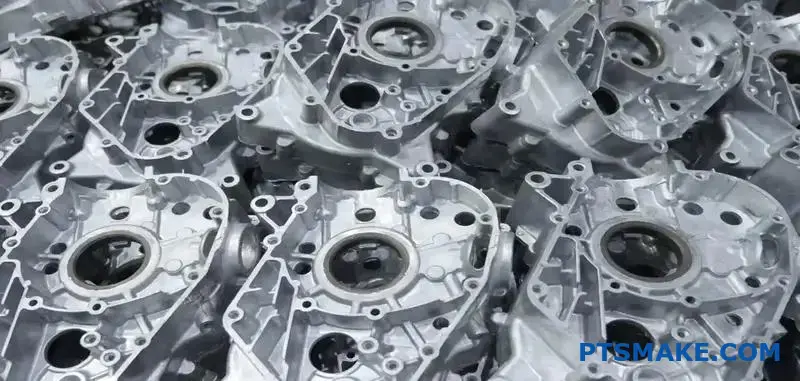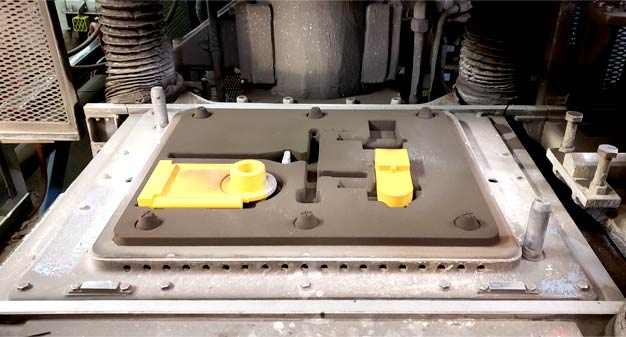Discover the Advantages of Aluminum Casting in Modern Production
Aluminum casting has arised as a pivotal process in modern-day manufacturing. Its light-weight yet robust nature presents considerable benefits for various markets. The capacity to attain elaborate styles and keep limited tolerances adds to its allure. Precision aluminum casting. Furthermore, the cost-effectiveness and ecological advantages make it a lasting selection. As manufacturers seek ingenious remedies, the duty of aluminum casting remains to advance. What specific applications and benefits await exploration in this dynamic field?
Strong yet lightweight: The Benefits of Aluminum
Although numerous materials are used in production, aluminum attracts attention as a result of its remarkable combination of lightweight buildings and remarkable stamina. This one-of-a-kind quality makes aluminum an optimal option for various applications, specifically in markets such as automobile, aerospace, and building. Its reduced density permits for much easier handling and transportation, adding to decreased power usage throughout production and setting up processes.
Moreover, aluminum's strength-to-weight proportion goes over, enabling suppliers to produce resilient components without including unnecessary bulk. This characteristic is especially beneficial in markets where weight reduction can cause improved gas efficiency and total performance. Additionally, aluminum's resistance to corrosion improves the longevity of products, additionally strengthening its charm in modern production.
Ultimately, the light-weight yet strong nature of aluminum settings it as a preferred material, cultivating innovation and efficiency across several fields. Suppliers progressively acknowledge that these advantages can bring about significant innovations in design and performance.
Precision and Intricacy in Design
As producers welcome the capabilities of aluminum casting, they discover brand-new methods for precision and complexity in design. This manufacturing procedure enables the development of detailed forms and thorough functions that standard approaches frequently battle to achieve. The fluidity of liquified aluminum enables it to fill complicated mold and mildews, causing parts with limited tolerances and fine surface area coatings.
This precision is especially advantageous in markets such as aerospace and auto, where exact specs are essential for performance and safety and security. Aluminum casting additionally fits innovative designs that boost functionality without endangering architectural integrity.

Cost-Effectiveness and Efficiency
Cost-effectiveness and effectiveness are extremely important factors to consider for manufacturers checking out aluminum casting as a manufacturing technique. Aluminum casting offers significant expense benefits due to its lower product costs contrasted to various other metals (Precision aluminum casting). The light-weight nature of aluminum decreases delivery and handling costs, and its excellent thermal conductivity enables quicker cooling times during the casting procedure, boosting general manufacturing rate
Aluminum's adaptability allows manufacturers to create complex shapes and styles, reducing the demand for additional machining or assembly. This streamlining of manufacturing not only reduces labor costs yet likewise reduces lead times, allowing companies to respond promptly to market needs.
Furthermore, the longevity and deterioration resistance of aluminum spreadings add to longer product lifespans, reducing substitute costs over time. As a result, makers can achieve an equilibrium of top notch outcome and minimized operational costs, making aluminum casting an increasingly eye-catching option in modern production.
Environmental Sustainability of Aluminum Casting
Aluminum casting attracts attention as an environmentally sustainable manufacturing option, particularly as a result of its recyclability and decreased environmental impact. The process enables the reliable use of aluminum, a content product that can be recycled indefinitely without losing its buildings. This particular considerably lowers the need for virgin aluminum, therefore minimizing and conserving all-natural resources energy intake connected with removal and handling.

Applications Throughout Industries: From Automotive to Aerospace
While varied markets proceed to seek ingenious products for production, aluminum casting has actually proven to be a flexible remedy across industries such as auto and aerospace. In the vehicle industry, aluminum castings add to lightweight lorry styles, improving fuel efficiency and performance. Parts like engine you can look here blocks, transmission real estates, and wheels take advantage of aluminum's strength-to-weight proportion.
In a similar way, in aerospace, aluminum casting plays a substantial role in producing complicated components that need high toughness and low weight. Airplane elements such as brackets, landing equipment, and structural frames use aluminum for peak performance and safety and security.
The flexibility of aluminum casting permits it to cater to other markets, consisting of consumer electronic devices, aquatic, and industrial machinery. This adaptability not just satisfies the specific demands of various applications however additionally sustains continuous development in making procedures. Therefore, aluminum casting stays a principal in modern production across many fields.
Often Asked Inquiries
Just How Does Aluminum Casting Contrast to Other Metal Casting Processes?
Aluminum casting offers remarkable strength-to-weight proportions, faster air conditioning prices, and superb deterioration resistance compared to various other steel casting procedures. These advantages make it suitable for numerous applications, enhancing efficiency and performance in manufacturing.
What Are the Normal Lead Times for Aluminum Casting Projects?
Regular lead times for aluminum casting projects range from two to 8 weeks, depending on factors such as intricacy, order size, and production ability. Effective planning can aid decrease delays and enhance project timelines.
Can Aluminum Casting Be Utilized for Intricate Layouts?
Aluminum casting can indeed accommodate detailed styles. Aluminum Foundry. Its fluidness enables thorough patterns and shapes, making it ideal for complex parts in different markets. This convenience improves style liberty while preserving architectural stability and performance
What Post-Processing Options Are Available After Aluminum Casting?
Post-processing options for aluminum casting consist of machining, brightening, surface treatments, anodizing, and welding. These methods enhance the surface, boost dimensional precision, and increase rust resistance, thus maximizing the final product's performance and visual charm.
Exactly How Do Temperature Modifications Influence Aluminum Casting Quality?
Temperature level changes greatly effect aluminum casting high quality by influencing fluidity, solidification prices, and prospective flaws. Quick air conditioning can bring about Web Site increased brittleness, while extreme warm may create bending or insufficient dental filling of mold and mildews during casting.
Aluminum casting has emerged as a crucial procedure in modern-day manufacturing. As suppliers embrace the capabilities of aluminum casting, they discover brand-new methods for precision and complexity in design. Aluminum casting processes typically generate fewer greenhouse gas discharges compared to other metal casting methods. While varied industries continue to look for ingenious products for manufacturing, aluminum casting has actually confirmed to be a functional option across sectors such as vehicle and aerospace. In the automotive industry, aluminum castings add to light-weight automobile designs, boosting gas effectiveness and performance.